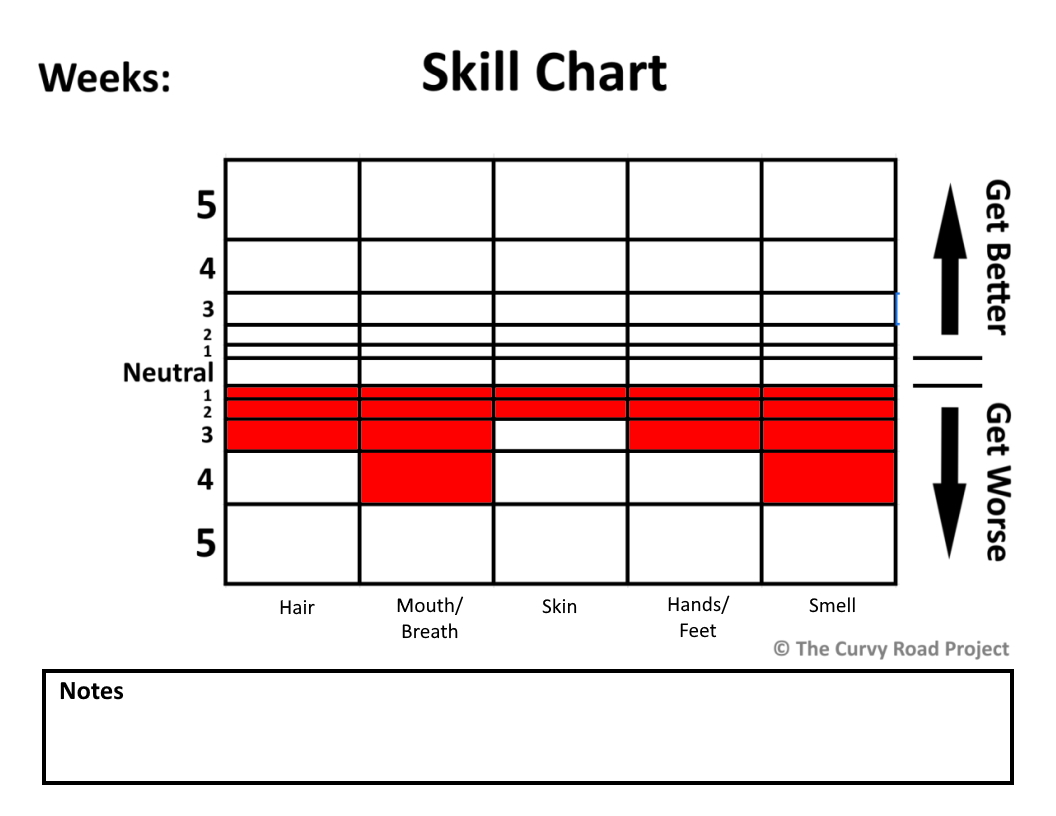Week #5: Grooming and Hygiene
In a previous post about the ideal human body, I discussed the idea that our bodies are packaging. In any given social situation where we’re interacting with another human being, what we look like dramatically affects the interaction. The higher the social score we have, the more positive, productive social interactions we have. So our goal is to do a lot of things right to boost that Social Score. BUT… we can do a lot of things right, then still have a social score completely sabotaged by poor grooming and hygiene. Hence this post.
Grooming and hygiene are the fourth (clothing), fifth (jewelry and ornamentation), and sixth (grooming and smell) things we notice about someone when forming an impression, If we look like a slob with disheveled hair, wrinkled clothes, spinach in our teeth, and smell like a cross between a hockey locker room and a dumpster behind a Chinese restaurant, we’re not going to do too well socially. In fact, poor grooming and hygiene can sink social interactions before they even begin. This person might have a Social Score chart that looks like this:
This poor sap might have a lot of things going for him, but his grooming and hygiene are killing him socially. If your grooming and hygiene suck, the first goal should be to get back to a neutral social score. We want to stop these variables from hurting you. If your grooming and hygiene are already adequate, we can set a goal to improve one or more to make your appearance start working in your favor.
For example, this guy:
As you can see, he has a stylish, well-maintained hairstyle, his mouth is clean and his breath is fresh, his skin is pretty good, his hands and feet are clean and presentable, and he smells good. This guy’s grooming and hygiene are working FOR him, not against him (like the other guy above.)
What Does Grooming and Hygiene Signal?
When we meet someone, the better their grooming and hygiene, the more we perceive them as being conscientious, which is one of the Big 5 personality traits. Conscientious people are happier, self-disciplined, trustworthy, will follow through on commitments, are achievement-oriented, thorough, are less likely to get divorced, and reliable - all positive social characteristics.
Conversely, the worse someone’s grooming and hygiene appear, the less we perceive them as being conscientious. People who are low in conscientiousness are less happy, impulsive, unreliable, tend to procrastinate, disorganized, irresponsible, insubordinate, more likely to abuse alcohol or other drugs, and are more likely to have extramarital affairs.
Beyond conscientiousness, good grooming and hygiene also signal how you’ve cultivated other aspects of your life, like your mental health, intelligence, willpower, empathy, openness, confidence, and social savvy (Max and Miller, 2015.)
Further, nothing can tank your love life faster than bad grooming and hygiene, especially for men. Most women are finely-tuned to disgust, which is mutually exclusive to sexual arousal. Not taking care of yourself and smelling bad are two of the six biggest turn-offs for women, which makes sense from an evolutionary perspective. Disease is one of our greatest natural enemies and filth denotes disease, ergo sexual disgust.
Needless to say, grooming and hygiene matter. A lot.
The Other Big Five
To make things easy, we’ll distill grooming and hygiene down to five basic elements that will serve as a checklist of sorts. Before we engage in social interaction (or leave the house), we’ll just mentally get in the habit of going through the list to make sure each one is okay.
Hair
Is my hair clean and minimally stylish? Or does it look dirty and disheveled? Am I free of dandruff?
I’m far from a hair health expert, but I know there’s disagreement on how often we should wash our hair. At a minimum, we should probably default to the “if it looks bad and/or smells bad, we should probably wash it” rule.
Mouth/ Breath
Did I brush my teeth today? How about flossing? Does my breath smell bad? Not sure? Here are a few ways to test your breath.
Way back when I was in college, there was this girl who got really drunk at a party, threw up everywhere, then passed out. The next morning, she woke up and went to class without brushing her teeth. That explained why you could routinely smell her breath from ten feet away. Needless to say, she was not welcome in many social circles.
Brush your teeth at least twice daily. Chew gum or use breath products if you’re engaging in close conversations.
Skin
Is my skin clean and a uniform color (no blotchiness or excessively oily)? Is my skin blemish-free?
Our skin paints a pretty accurate picture of our overall health. If we have an illness or disease, our skin appearance suffers. Same deal if we have a poor diet, are overly stressed, or don’t get enough exercise.
At a minimum, wash your face at least once per day with soap.
Hands/ Feet
Are my hands clean? Are my fingernails trimmed and free of dirt? If my feet are visible, are they clean? Are my toenails trimmed? Do my feet stink?
Most humans instinctively and unconsciously pay attention to each others’ hands, probably because they’re the first point of physical contact. If someone has dirty hands or fingernails, we typically have a “disgust” reaction and will increase the physical distance between us and them. This is probably an evolutionary response to avoid disease conditions caused by filth.
Our feet are less prominent, but the same rule applies. Dirty, smelly feet or gross toenails trigger disgust, which will repulse people. Back in the barefoot running days, I saw A LOT of feet. Most were clean and well-cared for. Some were disgusting. That latter group was basically social outcasts.
Wash your hands and feet as needed. Trim your nails at least once per week.
Smell
Do I stink? Did I try to overcompensate for potentially smelling bad by bathing in cologne or body spray?
If you’ve ever spent time around kids, you know they have phases of stink. If children bathe regularly, they typically don’t smell. Then they hit puberty and start sweating A LOT more. And the sweat now contains different hormones and chemicals that, when broken down, have a much stronger smell than child sweat. When this happens, kids don’t typically notice because of sensory habituation. And they usually haven’t started wearing deodorant yet. So they smell terrible. At some point in the next year or so, they really start developing an interest in potential mates, so they overcorrect their stinkiness by applying copious amounts of perfume, cologne, or Axe body spray. So seventh-grade classrooms smell like a locker room; ninth-grade classrooms smell like a French brothel.
We want to fall somewhere in the middle.
More specifically, we want to smell good. Which requires some knowledge about the intersection between biology and psychology. We give off chemicals called pheromones, which we cannot consciously perceive (they don’t smell.) But they have a profound effect on behavior. these chemicals are what cause the McClintock effect (where women living together will have menstruation cycles that sync up.) These chemicals also relay information about each other, like how compatible our immune systems are (which determine how healthy future babies would be.)
Pheromones also seem to signal how healthy we are. If we’re disease-free, have a good diet, get plenty of sleep, aren’t stressed out, and exercise regularly, our natural scent smells good to other people. The fewer of those boxes we check off, the worse we naturally smell to others. It’s worth noting this is part of the reason the foundational posts are the foundational posts - follow those first four ideas and you’ll get plenty of sleep, have a good diet, get exercise, and be stress-free… which should make you smell better.
However, this “natural smell can be a good” idea goes awry because people confuse “natural scent” with B.O. That repulsive scent given off by the sweat-consuming bacteria on our skin is never pleasant no matter how healthy you are. Back in the aforementioned barefoot running days, I encountered a lot of people who were really into the “paleo” lifestyle, which often included the god-awful combination of not bathing regularly and not wearing any kind of deodorant. It wasn’t good.
Regarding diet - what you eat matters. Generally, a balanced diet is going to produce the most appealing natural body scent. Strong-smelling foods, like onions and garlic, can be carried in sweat. Red meat or fish-heavy diet, a diet high in broccoli, asparagus, Brussel sprouts, cabbage, or cauliflower, spicy foods, foods with lots of curries, cumin, or horseradish, or alcohol can all create a less-than-desirable body scent. So eat or drink all of these in moderation.
Conversely, fruits and vegetables not listed above tend to improve our body’s natural scent. Eat more of these.
Putting all of this together, here’s my advice. First, bathe daily. That’ll go a long way towards preventing the gross funk. Second, wear some kind of deodorant/ antiperspirant. If you’re anti-aluminum, there are lots of decent options these days. Improve your diet by limiting the things that make you stinky and eating more of the things that make you smell good.
If you really want to hack your pheromones for maximum effect (assuming you’re healthy and eating a very good diet, including no alcohol) , the following routine is gold. Especially if you’re trying to attract a mate.
Bathe well with an unscented soap/ shampoo/ conditioner. This washes away the residual stink and excess bacteria.
Do enough exercise to work up a little bit of a sweat for two or three minutes. This releases lots of pheromones.
Air dry, then slap on some unscented deodorant. This prevents BO but keeps the pheromones intact.
Man, that was a lot of info about the smell!
Conclusion
When it comes to social interactions, what you look like and what you smell like matters. A lot. Make sure your hair is presentable. Brush your teeth. Wash your face. Clip your nails. Bathe regularly and slap on some deodorant. Get in the habit of covering these five bases and you’ll be starting social interactions on the right foot.
As some of you have probably noticed, this post covers the very basics of grooming and hygiene. Some folks obviously spend wayyyy more time on all five of these areas. If you have some grooming or hygiene tips you’d like to share, post them in our Facebook Group!
~Jason
***






